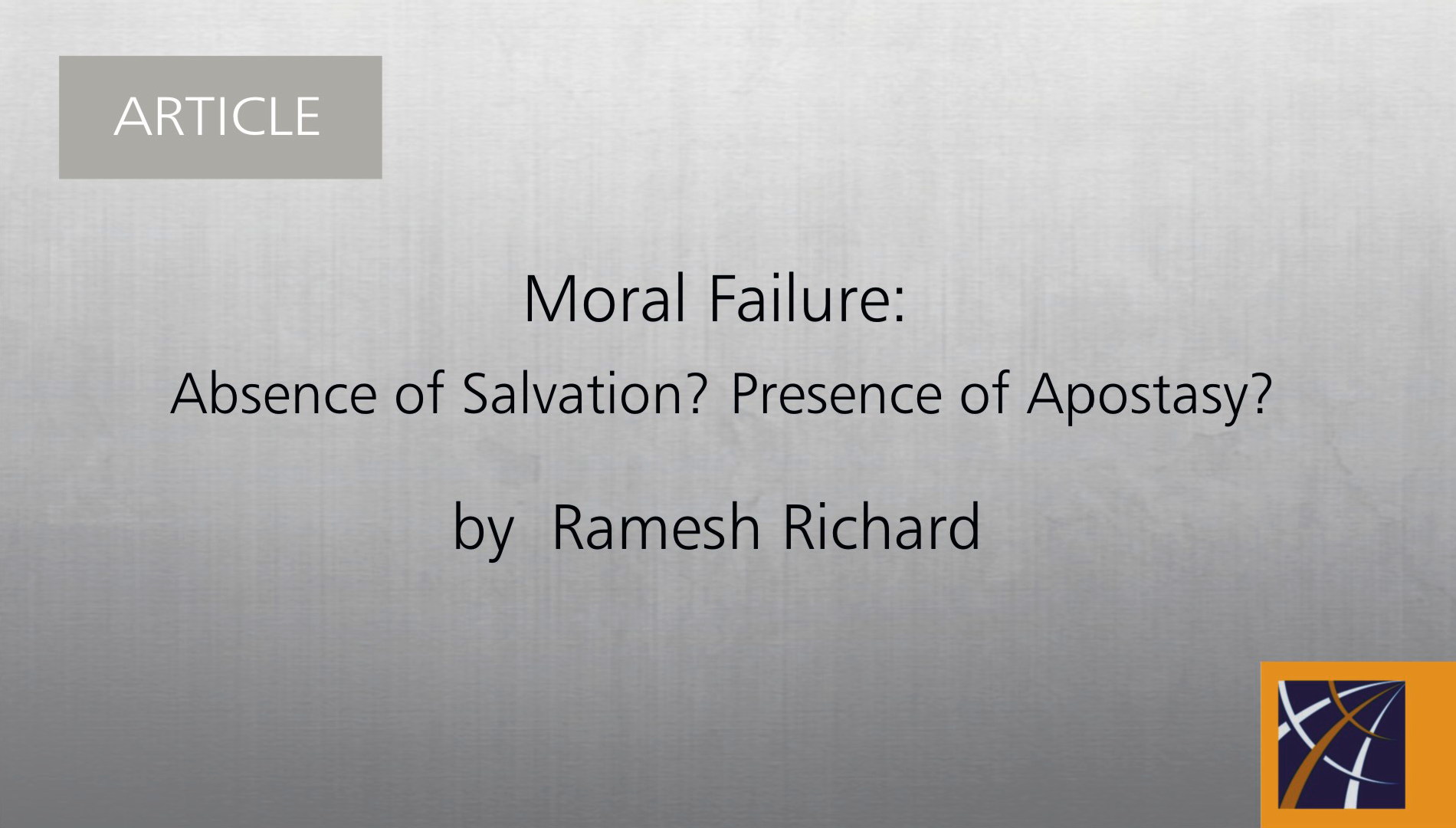I bless thee that thou wilt keep the sinner thou hast loved, and hast engaged that
he will not forsake thee, else I would never get to heaven. I wrong the work of
grace in my heart if I deny my new nature and my eternal life.
(“Assurance,” The Valley of Vision, A Collection of Puritan Prayers and Devotions, p. 92)
God has patiently put up with a history of leaders who fail His standards—of whom I am one. Although I am more aware of my sins of commission than omission, my every sin denies and defies allegiance to the Lord I love. My failures are spiritual defections. I must return to the One to whom I belong by confession, quickly and regularly, about attitudes and actions not aligned to His standards.
Short History
Higher profile spiritual defections—treason by moral failure and/or doctrinal apostasy—have generated a number of questions for those of us who are the lower-profile faithful. Before I provide biblical, theological and pastoral comment on our perplexity, here’s a short history on defectors in the Bible.
Spiritual defection began in heaven. Lucifer, the best among the best of God’s creation, turned traitor. He ran an insurgency against the Highest One. However, God’s Son, to whom all things have been handed by the Father, saw Satan thrown out of heaven (Luke 10:18; see also Rev. 12:7–10, Satan eventually thrown down to the earth).
Defection started in heaven and continues on earth. The first couple yielded to the tempter and locked the rest of humanity in a default stance of rebellion and defection from divine intent.
In the Old Testament, Israel is more known for defections than faithfulness to God and His law. Her worship of idols was led by her kings (e.g., 1 Kings 14:22–24) and denounced by her prophets as spiritual adultery and apostasy (e.g., Jer. 8:5). Judgment always followed defection (e.g., the cycles of the book of Judges) while a remnant line preserved the promise of a renewed future (e.g., post-exilic prophets).
New Testament characters also fare poorly in spiritual fidelity. Judas, the best-known case and an unbelieving devil (John 6:64, 70), deserted the One he had followed and who had trained him for years.
But what about Ananias and Sapphira, the early church’s married couple of corrupt land-donation infamy (Acts 5:1–11)? They had joined the early spiritual movement, when “those who believed were of one heart and soul” (4:32). Were they two believers who were struck down in their moral failing? Had they joined the movement superficially, spies in the ranks who never held allegiance to Jesus? Or did they once believe, yet let greed destroy their position in Christ?
Personal Tendency
Even when we have experienced spiritual regeneration, a defector tendency runs in us. Left to ourselves to persevere in faith, we defect to prior allegiances and act in propensity toward alternate commitments. But while the Father has not left us to ourselves and has delivered us from the kingdom of darkness, transferring us into the kingdom of His beloved Son (Col. 1:13), He merely invites us to interact with His Spirit to mature in belief and behavior as citizens of a new kingdom; He does not force us to comply.
Since in Christ we have redemption and forgiveness of sins (Col. 1:14), we have been rescued from our state of rebellion. That rescue, however, doesn’t keep former rebels from defecting from the ranks and deserting camp by falling into grievous sin. And what happens if a believer intentionally changes sides and turns traitor?
Well, those are some of the matters to ponder as we think about where our personal tendency fits in the ongoing history of defection.
Spiritual Spectrum
Spiritual defection traverses a spectrum from doubt to denial to desertion. John the Baptizer’s doubt (Matt. 11:2–3) about Jesus’ messiahship or Thomas’ doubt expressed at our Lord’s resurrection (John 20:26–29) are classic cases that Jesus quickly assuaged with an early version of show-and-tell.
Indeed, there is spiritual defection every time we sin. Our spiritual fathers, both Abraham and David, defected morally—a practical apostasy. As Christians we believingly confess our sins. The faithful and just God forgives and cleanses us from all unrighteousness (1 John 1:9). He restores us to fellowship without asking us to guarantee a sin-free future. Spiritual doubt and defections happen all the time, but these are temporary. When leaders morally defect, consternation spreads among followers. My prayer is that I never use another’s sins to justify my own.
Also a subset of spiritual defection is ministry desertion. “In love with this present world,” Demas, a firm and former supporter of the apostle Paul, deserted him (2 Tim. 4:10; cf. Col. 4:14). Ministry desertion breaks the heart of fellow leaders and shocks relevant publics. Yet just as spiritual repair was extended to John (also called Mark), we will take the long view on any person’s ministry desertion. John/Mark was not only eventually welcomed back by Paul (2 Tim. 4:11), but he also likely became the Gospel writer with the apostolic backing of Peter, the denier. Peter extended to John/Mark the restoration he had experienced himself.
What, however, if core Christian convictions are repudiated, not just in heresy by the ignorant, but as doctrinal, Christological apostasy by the well-informed or as persistent, practical apostasy intentionally hidden and left unconfessed? And more urgently, how should we think of a defector’s previous fruitful ministry when he or she renounces all past beliefs and accomplishments or we discover a double-agent life between profession and practice? Is the whole fruit made rotten by shameful revelations?
All defection is sin, and all sin is defection. But not all defection is apostasy, though all apostasy is defection. There are greater and lesser sins (see John 19:11, of Caiaphas and Pilate). Apostasy of a permanent kind (e.g., false teachers, Hymenaeus, Alexander and Philetus, 1 Tim. 1:20, 2 Tim. 2:17) is a more grievous sin than an apostasy of a temporary kind. Both are sin, but permanent, blasphemous apostasy appears as unpardonable as a sin leading to death (1 John 5:16). While Jesus prays for forgiveness of those who do not know what they do to Him (Luke 23:34), He also speaks of unpardonable sin: attributing a demonic source to Jesus’ Spirit-credentialed works (Matt. 12:32). This sin the Pharisees were about to commit without remorse, regret or repentance reflects the hardened heart and calloused conscience of those repudiating the Jesus they once knew.
Critical Questions
When we encounter the doctrinal apostasy or moral failing of leaders we respected and loved, how do we as ordinary but growing believers in Jesus respond to the questions that come to the fore? Let me identify and address four relevant questions that have reached me over the past several months.
1. Is Christianity even true at all?
There is only one right response, a prohibition and a pointer: Do not look to any Christian or leader, not even the best apologists, for your confidence in, corroboration of, or convictions about the Faith. Each of us as a fallen human being is capable of disappointing. Look to Jesus alone, and point others to Christ alone. He will not fail.
Why? Because He is true and the truth. He will be true to you and is the truth for you and all people. A student asked Princeton philosopher Diogenes Allen about why he should go to church. “Because Christianity is true” came the astute reply. The truth of Christianity does not depend on whether anyone believes it or acts consistently, since no Christian is fully consistent. Christianity is true and truth because of Jesus the Christ, and exceptionally so because of His historically verifiable and unique self-resurrection from the dead. Let Him be your only standard, the author and finisher of everyone’s faith (Heb. 12:2).
2. Is Christian conversion real?
All kinds of conversions occur, from political switching to fashion trends. This is one reason we avoid probing the conditions, circumstances and causes of conversion to and from Christianity. There’s also something real about conversion within and between religions. Not long ago, a Sikh young lady in Pakistan turned Muslim “of my own freewill.” Christian Paul, too, was considered a Jewish apostate (Acts 21:21), as are “infidels” who leave their birth-faith to believe in Christ.
The reality of conversions makes no conviction true or untrue, even if a person is divinely rescued from the edge of a suicide bed. Indeed, we know, see and hear incredible testimonies of changed lives as a result of coming to Jesus. These stories confirm what happens in a person who comes to God through Jesus, but they do not prove the Christian faith. We shall neither consider nor publicize high-profile conversions (nor defections) as enabling (or disabling) consideration of Christ. Testaments of conversion (or de-conversion) corroborate but neither verify nor falsify the faith (or its lack) to a potential convert or anyone else. At best, the moral failure of the converted provides opportunity for outsiders to vilify the faith.
Personal, ongoing assurance of conversion arises from the declaration by Jesus that “he who hears My word, and believes Him who sent Me, has eternal life” (John 5:24, emphasis added). The possession, not just the possibility of future eternal life, holds good through disaffection, dryness or defection. May I alert you to never base assurance of the reality of your conversion on anything other than God’s Word, not even on the presence of your good works? A prayerful, meditative life will experience subjective assurance of God’s Spirit, confirming God’s objective Word that you are the child of God. With God’s Holy Spirit witnessing to the human spirit, let’s never get over the miracle of conversion. It will help overcome shorter-term dryness and prevent longer-term spiritual defection.
3. Is perceptible fruit necessary to prove the truth and reality of one’s salvation?
Recent defectors did once bear fruit—and much fruit—which accounts for our confusion. Just as we must nuance and extend questions in such discussion and debate, perhaps we will find help by slicing into smaller pieces this theological question about their betrayal of what they had once professed.
Here’s the knife we will use: “Prove one’s salvation to whom?”
3a. Is perceptible fruit the proof of salvation to God? No. God innately knows who is saved in His own way of intuitive and immediate knowing.
3b. Is perceptible fruit the proof of salvation to ourselves? Not at all. Merely our sins of omission would keep us uncertain about our salvation. The apostle John states that certitude about our salvation is based on what is written (1 John 5:13).
3c. Is perceptible fruit the proof of salvation to others? Yes indeed. Whether accurately or inaccurately, others may conclude that a person is not saved, has never been saved, or has lost his salvation by the lack of good works in the life of the believer. That is, you shall know them (others, not yourself) by their fruit
(Matt. 7:16, 20).
One can confidently know his or her own eternal salvation by Scripture but reasonably conclude that another is unsaved by his or her unchristian behavior. And since you don’t want to confuse others, examine your behavior by Scripture, and seek to become like the Son by the Holy Spirit. Please do not confuse us by your unbiblical behavior as we will come to the wrong inference about your conversion. For God’s sake, change your behavior. Or change your behavior for the sake of the rest of us to prevent our erroneous conclusion about your lack of salvation.
4. In view of the defection of Christian leaders, is Christ’s salvation permanent and safe forever?
Before we go into this answer, a biographical comment will allow for deeper understanding of the commentary.
Hindu parables on human relationship to deity, especially the role of meritorious works in salvation, began at least a century prior to the Protestant Reformation debates. Those frame well the consideration of this and the prior question in view of the superficial state of the contemporary church.
My salvation understanding began in India embracing a monkey school of justification and sanctification. An infant monkey clings to its mother even as the mom holds onto it. I was taught and believed that at some point, by some final sin, we can come to the end of God’s rope and our salvation becomes unraveled. For after all, Hebrews 6:4–6 seems to grant no possibility for those who fall away to be renewed again to repentance.
I now hold to the cat school of salvation and the spiritual life. A kitten is picked up and carried by the mother without the kitty clinging. Unafraid of getting dropped, the beloved kitty jerks and jolts through many a twist and turn, but is safe on its journey to the destination.
Similarly, knowing everything about me, my potential times of belief and unbelief, and actual layers of moral and immoral behavior, the sovereign Savior picked me up, carries me now, and delivers me to an eternal destination. He finishes the good work He has begun in me (Phil. 1:6). I don’t have to be afraid of being dropped even when I object to His carrying me by my neck.
For every biblical text that creates doubts about one’s eternal salvation, another passage, by the very same author, confirms the permanence of salvation. For example,
• The confidence of Christ’s permanent priesthood and intercession as able to save us forever (Heb. 7:24–25) balances out the worry from the warnings of Hebrews 6:4–6. These warnings, examined independent of all else, prove and prevent too much, that once lost after being saved, one is always lost. But no theological position holds that there remains no chance of repentance for defectors. We must hold to the definite perfection of the sanctified in Hebrews 10:14 while heeding the warnings of Hebrews 10:29–31. The evil, unbelieving heart (Heb. 3:12) is equalized by the sincere and believing heart (Heb. 10:22).
• One NT author’s dual tone of warning and assurance pervades his classic “epistle of apostasy.” Jude integrates the believer’s doctrine with behavior, but distributes God’s perseverance and protection of those called, beloved in God the Father, and kept for Jesus (v. 1). This “theology of keeping” exhorts believers to “keep yourselves in the love of God” (v. 21), though deniers have crept in to cause doubts and uncertainty (v. 4; vv. 6, 13 speak about kept and keeping for destruction and darkness). It climaxes with the magnificent doxology to the Only One who is able to keep them (a synonym) from stumbling and to present faultless saints with joy in a fitting, future and final offering to God (vv. 24–25).
• Paul in Romans uses a prophetic past tense to indicate those justified as the exact ones glorified with no fumbling by God in the process. Yet, as Israel’s national apostasy caused them to lose their priority and place in the divine plan, the prideful unbelief of Gentile believers can also bring on the kindness and severity of God’s judgment (Rom. 11:1–25). Fortunately, just as national Israel will be restored to salvation (v. 26) at the fullness of the Gentiles (v. 25), the Gentile-justified, in a mix of belief and unbelief, will experience no permanent casting away but will be restored to salvation until they become the Gentile-glorified. No wonder we see the exuberance of yet another apostolic doxology at the end of God working out His national and global plans in history and geography (Rom. 11:33–36)!
• The strength of the double negatives of the impossibility of being snatched out of God’s hand (John 10:28–29) overwhelms the pruning removal of the fruitless from salvation (John 15:2, 6) in order that they may bear more fruit. The withdrawal of “many” of His disciples (John 6:66) is possible, even among chosen followers (cf. 6:70–71), and yet one who is drawn by God to Jesus does not get lost. Jesus loses none of them (6:39) and raises them on the last day (6:44).
The clincher for me on the issue of eternal life is the very meaning of eternal in that life. If eternal life can be lost for any reason at all, it is not eternal by any definition. In addition is the question of proportionate contribution. To the extent to which one contributes to salvation, to that extent it can be undone. Contribute much to it, undo it easily. Contribute a little bit, undo it eventually, with one too many sins. Contribute nothing, and simply receive it as a gift of God’s unconditional grace and unmerited favor, and only the Giver can undo it. Faith is not an efficient cause of salvation. And since faith is only the instrumental means to salvation, it is powerless to create, source, give or return God’s unilaterally orchestrated salvation.
Does this eternal position lead to spiritual defection in belief/behavior? Actually, both positions on salvation security could lead me to spiritual defection, but not necessarily so. If I can morally defect and lose salvation with the option of being saved repeatedly, what prevents me from using (or abusing) that option repeatedly? If I cannot lose salvation, and thus intensify my defective belief and rebellion, the Bible still speaks of earthly and eternal losses: lack of spiritual vitality, joy, holiness and fellowship; loss of physical health or physical life; devastating consequences on personal or God’s family; and the denial of future reward of royal reign (2 Tim. 1:12).
While none can snatch me out of God’s hand, I can choke myself to death by trying to wiggle out of His hand. God’s life grip becomes a death grip in the defector’s life. Any and all sin is treacherously serious and of infinite weight, which is why it took the infinite worth of the death of God’s Son to cover it.
Is moral failure the same as doctrinal apostasy? No. Let’s define the latter by contrast. An apostate is not a mere backslider into moral debauchery, or one who relapses into former beliefs because of socio-economic persecution. No one holds to the truth perfectly in faith and practice. In fact, a believer can become hardhearted toward the Savior.
Since spiritual birth, like physical birth, happens at a point of time—a moment of crisis rather than a process—to ask a process question of a crisis event leads to category confusion. A process can be made up of a series of crises, but a crisis is not made up of processes. So, a daily conversion from unbelief to belief is part of the present process of a past point of salvation.
While the past aspect of regeneration cannot be undone, the present can go awry—and therefore we have need to spiritually grow. Thus, a hardhearted believer is not an apostate.
Instead, an apostate is one who publicly announces and intentionally renounces belief in who Jesus is and other previous beliefs and actions done for Jesus and in Jesus’ name; the apostate advocates a contrary faith.
Is moral failure the same as spiritual defection? Yes. By apostolic pattern, a regenerated person who continues in his immorality is to be disciplined and excommunicated from the church. A person’s high-risk behavior may result in premature death, but his spirit is preserved (1 Cor. 5:5). Our works may be burned at the final assessment, but we ourselves are saved as through fire (1 Cor. 3:15). Should we repent, publicly, we can be received into fellowship—and if quickly, potentially into public leadership. Peter, the example of the believer apostate, was reinstated by Jesus Himself. Sinful disaffection was not considered a desertion since he did not join a group opposed to Jesus to publicly voice a new allegiance. Here’s the “bad” news for regenerated apostates: The baby is carried by the mother despite its denials of belonging. It is never severed from the mother’s loving hold.
Until death, and from a human point of view, the jury (and a “welcome back” sign) is out on all potential apostates and spiritual defectors. I pray that Jesus will prevent and forbid me from ever taking a path of doctrinal apostasy or moral failure, even temporarily.
In terms of fallen brothers or sisters, I dare to hold them as brothers and sisters who became dishonorable vessels in the household of faith until their death, or sadly dishonored after their death by the same faith-household for engaging in “immorality of such a kind as does not exist even among the Gentiles” (1 Cor. 5:1a). They chose a perilous path and became the subjects of tears and scorn. Their faith, already mocked by non-believers, rocked the faith of their followers. They may justly be removed from being a further detriment to Christ’s reputation.
If still left alive, may they be grateful for the opportunity to return. If defectors repent from reprobate behavior, not knowing when their end will be, they mimic the prodigal who realized better (Luke 15:17). Paul assures us, “If we are faithless, He remains faithful” (2 Tim. 2:13).
If they reaffirm their love for Jesus, they are reinstated into a new spiritual trajectory by Christ, whether we like or trust them or not. They must return and press on to maturity. Until then, like the writer to the fledgling and wavering believers of Hebrews, we apply warnings as a persuasive means to maturity. Come back from squandering your salvation and being judged. Let us both press on to maturity. “This we will do, if God permits” (Heb. 6:1-3), since we are “convinced of better things” (Heb. 6:9) concerning you.
If they keep crucifying the Son of God afresh and holding Him up to contempt (Heb. 6:6) till they breathe their last, they were never regenerated in the first place. Their ministry did give life to some, but their departure stumbled many a young believer and confused many more. Indeed, they had called Him “Lord, Lord,” in their fruit-bearing years, but He answered, “I never knew you.” The Jesus they once claimed to know in public ministry had never known them in saving relationship (Matt. 7:21–23).
The Lord Jesus asks two central questions to each of us, the same two questions that went out to Peter, a believing, but temporary defector:
“Who do you say that I am?” Before our Lord’s crucifixion and resurrection, Peter’s personal confession about the Christ as the rock on which Jesus builds His (not our) Church is revealed by heaven. Sadly, Peter’s serious denials as the rooster crowed reflect what we are capable of in temporary unbelief and misbehavior. Peter had been sifted like wheat by a Satan who is strategically, powerfully and constantly active against God’s servants.
“Do you love Me more than these?” Here we have our Lord’s post-crucifixion and resurrection invitation to Peter: With less self-confidence and more self-diffidence, this time without competition or comparison with fellow disciples, Peter’s unequivocal reaffirmation of love provides for his spiritual reinstatement and ministry responsibility (John 21:15–17). In effect, having resolved the primacy of his affection for Christ as his God, the Lord dissuades him from being concerned about anyone else’s spiritual relationship with a straightforward, You, follow me (v. 22c). Regardless of Christ’s future for anyone else, let’s focus on our personal loving, believing, following, serving of Jesus till the end of our lives (v. 18).
[/fusion_text][/fusion_builder_column][/fusion_builder_row][/fusion_builder_container]






